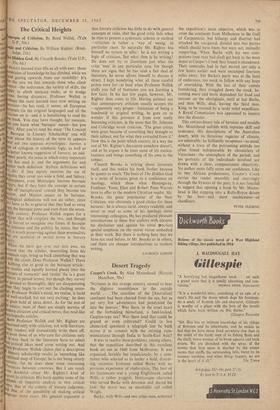iece The Critical Heights
s
e Hidden God. By Cleanth Brooks. (Yale U.P., 35s. 6d.)
RtIALLY learned man fills us all with awe: those ountains of knowledge he has climbed, while we and gazing upwards from our molehills! It's ke the awe we feel towards those who climb verest—the endurance, the variety of skills, the bility to climb intricate rocks, or to trudge rocs boring distances. Professor Wellek is haps the most learned man now writing on terature—he has read, it seems, all European
erature (in the original languages) and all the
theism on it—and it is humiliating to read his tfo 1'v book. You may have thought, for instance, leer ,at You knew what 'baroque' meant—but you dro 'dal. After you've read his essay 'The Concept ess: f Baroque in Literary Scholarship' you will is new about the history of the term (it appears of ere are two separate etymologies : baroco, a Pe of syllogism in scholastic logic, as well as e better known suggestion of barroco, an odd- aped pearl); the sense in which every important relic has used it; and the arguments for and gainst 'each definition. Stylistic definitions will °t do : if they n\erely mention the use of enceits they cover too wide a field, and Sidney, hakespeare, even Montaigne become baroque liters; but if they limit the concept to certain nds of 'metaphysical' conceit they become too 'row, and Marino Ceases to be baroque. he Leological definitions will not do either, since
°eY have to be so general that they lead us away
01D the baroque poets and even from the seven- nth century. Professor Wellek argues for a Incept that will correlate the two, and though is forced to recognise two forms of baroque he intimate and the public), he insists that the rm is worth preserving against these nominalists 110 are sceotical of neriod terms in literary
gory. When we have got over our first awe, we hand that the scholar, descending from .his euntain tops, bring us back something that was °rth the climb. Does Professor Wellek? There nothing else as good as the baroque article : 0 similar and equally learned pieces treat the neepts of 'romantic' and 'realist' (he is a great hover in period terms), but though they survey ground as thoroughly, they are disappointing hen they begin to sort out the clashing mean- 8s. Professor Wellek's mind, we realise, is lucid d well-stocked, but not very exciting : he does grab hold of ideas direct. As for the rest of dunessays, most of them are simply surveys of ihe dery criticism and critical terms, that read like cat eycloptedia articles. nsi Both Profeskor Wellek and Mr. Righter are val ncerned only with criticism, not with literature. any readers will immediately write them off,
III even those of us who care for criticism only a way back to the literature have to admit at critical ideas need some sorting out. And hen Professor Wellek claims that a description s literary scholarship results in `something like Piritual map of Europe', he is not being utterly ntastic, for he does show some interesting ITerences between countries. But I am much 're doubtful about Mr. Righter's kind of terest in criticism. His book applies some of the 'ethods of linguistic analysis to two critical _nes, that of the criteria of literary judgment, " that of the possibility of making critical rInage more exact. His general argument is
on
'a an .n:rh A th6 .a 0119 alit npi 3og
hat- b hi Lte IOW his )05, his ns.
ttli
!so var his for :ist iY
iv )11, cd w'
art
nit
itl that literary criticism has little to do with general concepts or rules, that the good critic fails when he tries to present a systematic scheme or method --criticism is rather a 'way of seeing,' in particular cases. So naturally Mr. Righter has himself no system to offer : he is not writing a logic of criticism. But what then is he writing? He does not try to illuminate just what the critic 'sees' in any particular case, for though there are signs that he has read a fair deal of literature, he never allows himself to discuss it direct. I kept wondering what all these careful points were for—at least when Professor Wellek stuffs you full of footnotes you are learning a few facts. In his last few pages, however, Mr. Righter does come to life. Having pointed out that contemporary criticism usually accepts the —apparently very proper—limitation of being a handmaid to original writing, he goes on to wonder if this prevents it from ever really becoming criticism, in the sense that Dr. Johnson and Coleridge wrote criticism. 'The great critics were great because of something they brought to their subject, not for what they extracted from it.' Now this is the point which matters, in a way the rest of Mr. Righter's discussion somehow doesn't, and as he argues it he loses some of his meticu- lousness and brings something of his own to the subject.
Cleanth Brooks is writing about literature itself, and this makes his book livelier because he quotes so much. The basis of The Hidden God is a series of lectures given to a conference on theology, which show what Hemingway, Faulkner, Yeats, Eliot and Robert Penn Warren have to offer to the modern Christian reader. Mr. Brooks, the great populariser of the New Criticism, was obviously a good choice for these lectures : he is always lucid, always readable, and never as mad as some of his (perhaps more interesting) colleagues. He has produced pleasant introductions to these five authors with (despite his disclaimer and against his usual practice) special emphasis on the moral vision embodied in their work. But there is nothing here that we have not read before, in Mr. Brooks or in others, and there are cheaper introductions to modern writing.
LAURENCE LERNER






































 Previous page
Previous page